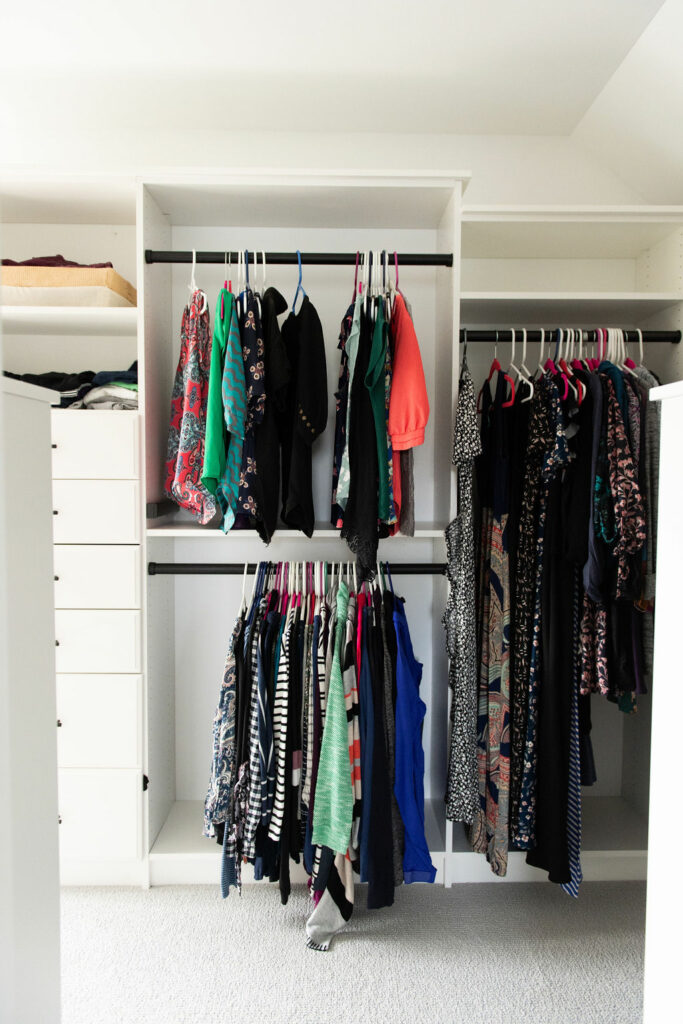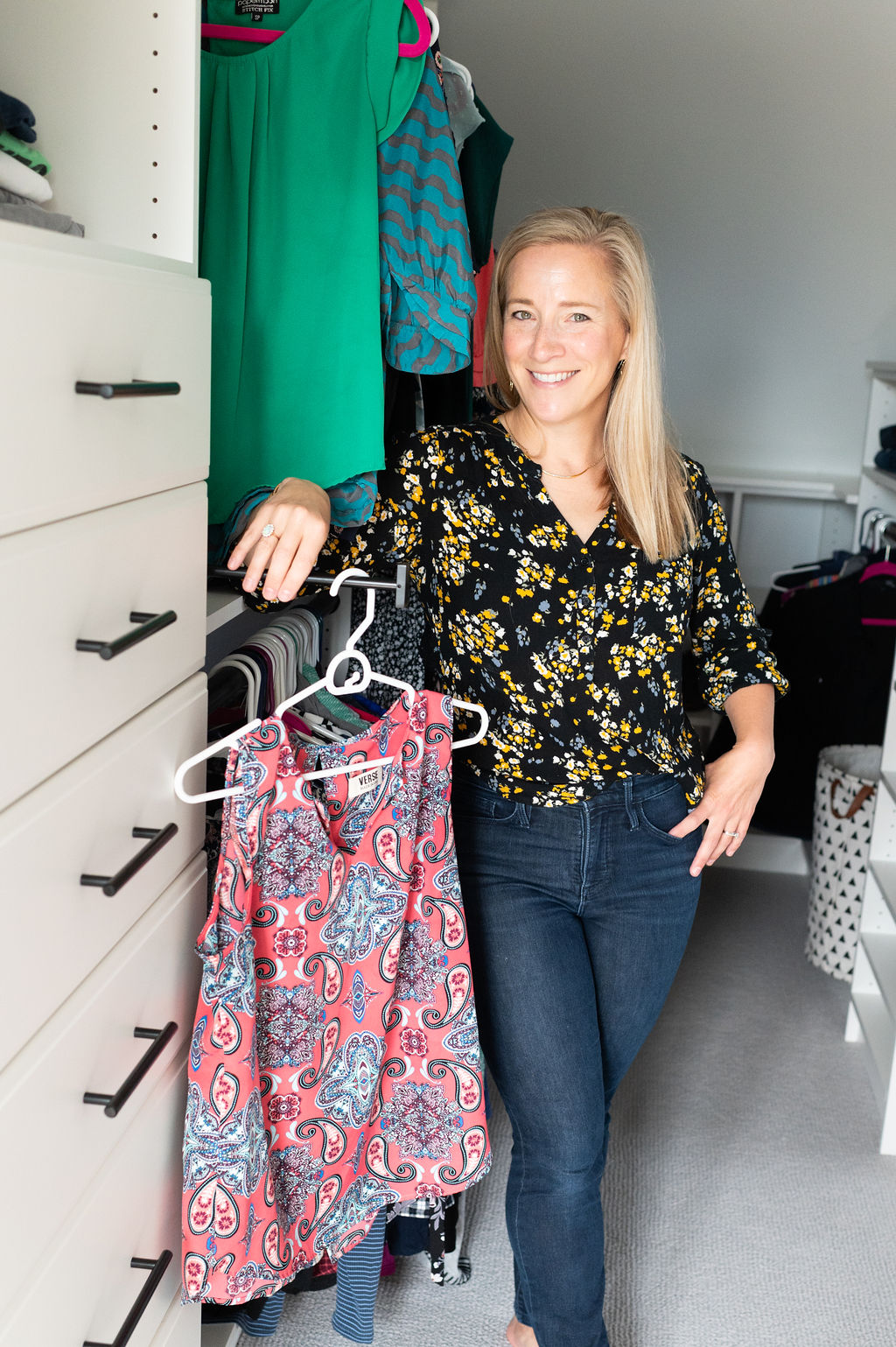On a decluttering kick? This post will show you how to declutter clothes in a few easy steps.
(My closet design is by EasyClosets)
With fall well underway, it’s time to put away the shorts and tees and break out the scarves and cardigans. With your closet transitioning along with the season, it’s the perfect opportunity to set aside time to go through and declutter your wardrobe.
Clothes are one of the fastest households items to accumulate and the more you take in, the more stressed you’ll get every time you open up those closet doors. Decluttering clothing not only ensures you know where each item is being kept, but also guarantees you’ll only be wearing your favorite clothes each day.
It may seem like a daunting task on the frontend, but the journey can be freeing, cathartic, and most of all, fun! (Decluttering Is Also Good For You!)
So let’s dive in to some effective and practical strategies for decluttering those fits. (And if you’re a checklist kind of person, check out this post: Decluttering Checklist)
How to Declutter Clothes
Step 1: Clear Out and Sort
The first thing we need to do to start decluttering is get everything out into the open. You’ll want to make three separate piles to sort each item into: a “keep” pile, a “maybe” pile, and a “donate” pile. Alternatively, you can have a fourth “recycle” pile for items that are too worn or hole-y to be worth donating.
You can even create sub-piles for specific articles of clothing or accessories like hats, shoes, tees, dresses, etc. Having this assorted breakdown is not only visually pleasing, but it can help you focus on which areas of your closet need the most focus. It will also help you when you get to the fun part: organizing!
This first step is often the toughest. Your “donate” pile may start out a bit light if you find it hard to say goodbye to most items right off the bat. But that’s ok, because our next step is really what will help shed those rose-colored glasses and make sorting easier to decide.
Step 2: Fashion Show!
Our bodies inevitably change over time. What might have fit just right a year ago may be a little too snug or too loose today. That’s why it’s super important to try on every item in your “keep” and “maybe” piles (you can skip pieces you’ve been wearing the past few months, obviously.)
A few things to keep in mind when trying on your clothes:
- Does it fit me well?
- Do I like how I look in this?
- Do I like how I feel in this?
- Is this my style?
- How well can I incorporate this into the rest of my wardrobe?
- Functionality: Will I wear this regularly, or will it end up sitting in my closet? (This won’t apply to certain seasonal items, like snow boots)
- If I were shopping right now, would I purchase this?
- Have I worn this in the past 12 months?
Step 3: What Goes Out Does NOT Come Back In
Now that you know what’s staying and what’s going, it’s time to say goodbye to your old clothes. For nicer items in good condition, you can always try and sell them at a consignment store first. And then, whatever isn’t accepted can be taken to your nearest donation center, like Goodwill or the Salvation Army. It may also be worth checking if you have younger family members (not to be confused with Younger family members LOL!) who may benefit from a few hand-me-downs. But the important thing is that once those items leave your house, they don’t come back in.
Related post: How To Organize Kids Clothes

Step 4: Be Tough with Your Stuff
Keeping a clutter-free wardrobe requires consistent upkeep. It’s always a good idea to continuously reassess your clothing needs throughout the year, not just during seasonal changes. Here are a few extra tips for maintaining a simplified, clean closet:
Create a Capsule Wardrobe
A capsule wardrobe is an effective and minimal approach to dressing yourself each day. It generally consists of a range of just 25-40 items that are both versatile, but can be paired and utilized together. Having a minimal wardrobe like this can cut down on decision fatigue each morning and create a style this is streamlined and functional, yet still unique and personalized. You probably know that I own a ton of neutral colors – black, navy, and jewel tones are my favorites, and they are easy to mix and match than a lot of patterns.
The Hanger Trick
You may have heard of this one before, but it’s a great little way to track what you’re wearing throughout the year. All you need to do is turn your hangers around so that they’re all backwards. Then, when an item is worn, you just turn it back around the right way. Overtime, you can visually see what you have worn and what is simply becoming clutter! You can also modify this strategy for clothing in a dresser. Instead of turning around hangers, all you need to do is fold your clothes and have them all face away from you. Then when something is worn, turn it around to face you.
Shop with Intention
An important part of your wardrobe upkeep is being strict with what gets added into it. When out shopping and looking at clothing, one of the first things you should ask is, “Do I need this? Or do I just want it?” A good rule of thumb is that you can have two types of similar clothing articles: one item that is a basic/essential piece, and one that is more of a statement piece. A third item could be an in-between, but more than that and you’ll risk cluttering up your closet again! And keep in mind, this may exclude certain items that are needed for a very specific functionality or season.
Something In, Something Out
If you really want to be tough with your stuff, you can also make a rule that for any new item you add into your wardrobe, something must come out.
We all get sentimental about clothing, so decluttering your wardrobe can sometimes be a difficult and even emotional process, but one that ultimately brings peace and value to your life. A clean, clutter-free closet eliminates so much unneeded stress and helps bring new joy and a fresh perspective to the clothes you wear. It also ensures that you’re wearing clothes that you love every single day and gives old items a new home for someone else to love!
Decluttering More Rooms?
Ready to move on to the next space? Check out these posts for further tips on decluttering your home!

